5 Tips for Making Stronger Landscape Photographs
Hey everyone! I've been wanting to write up this kind of blog for a while now and I've finally found the motivation to actually get it done. The goal of this is to help anyone who might be struggling with their landscape photography, or anyone that might be looking for some fresh ideas. The primary focus will be on things that can be done in the field to strengthen your compositions. In my opinion, this is the hardest part about photography! However, I will occasionally touch on the editing side of things, because it still affects composition. A few images in here I may have already written about in previous blogs, however I'm using them again because they make exceptional examples for the techniques I am discussing.
1. Leading Lines and Curves
We will start this off with a classic one: leading lines and curves. I'm a firm believer that leading lines are one of the most powerful elements you can incorporate into a landscape photograph. If you go look at the portfolio of famous landscape photographers like Marc Adamus, Ryan Dyar or Galen Rowell, you'll notice that many of their works incorporate this technique. It's simple and effective, but it's not always simple to find nice lines!
I find that straight lines, parallel to the direction of the camera, often do not work well and are best avoided. What you really want to keep an eye out for are converging or diverging lines, or even S curves. These work so well because they gently lead the viewer around different parts of the image, ending up in the background.
Below is an image I've shared here before, but it's strong example of a leading S curve, so I'm sharing it again:
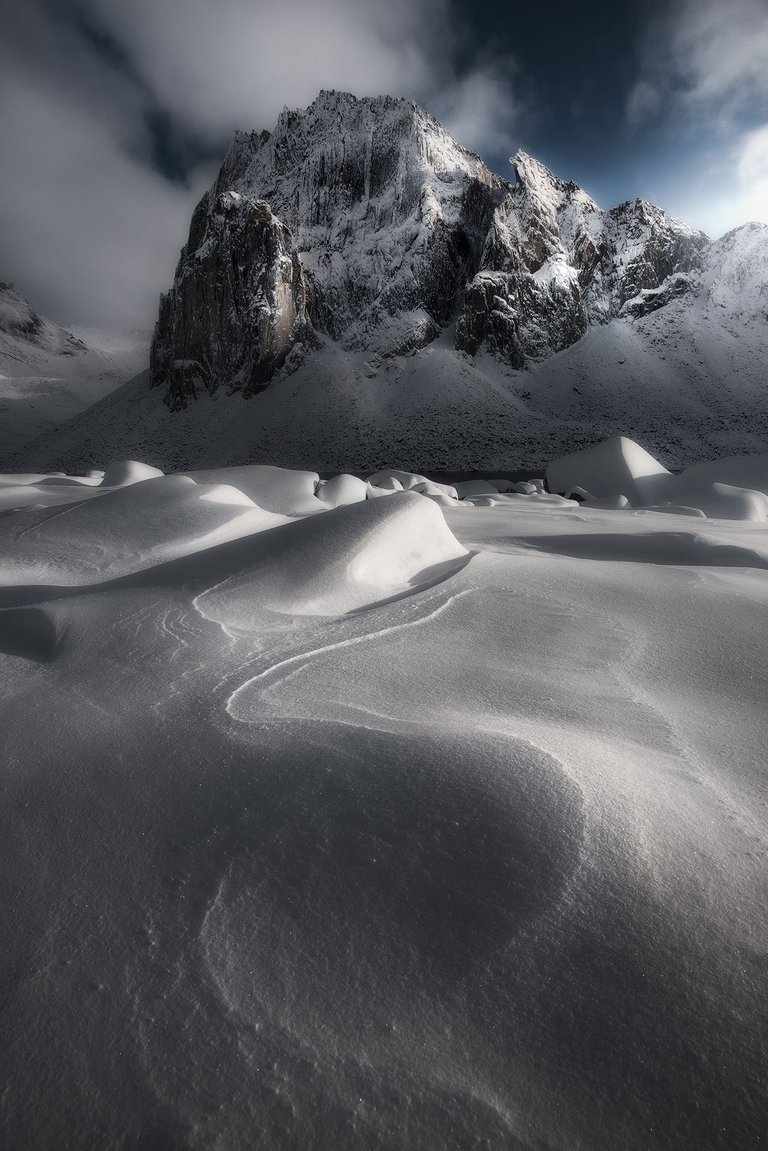
The lines in the snow guide the viewer's eye from the foreground, to midground and then finally to the mountain the background.
2. Avoid Distractions, Be Intentional
When I was a new photographer, I took photos of anything and everything, in a long learning process to figure out what works and what doesn't. It took me quite some time to realize that no part of the image should go to waste or distract the viewer: you want every part of your image to serve a purpose. Photographers like Marc Adamus and William Patino are masters of this. In many of their images they manage to cram many, many interesting elements in a cohesive way.
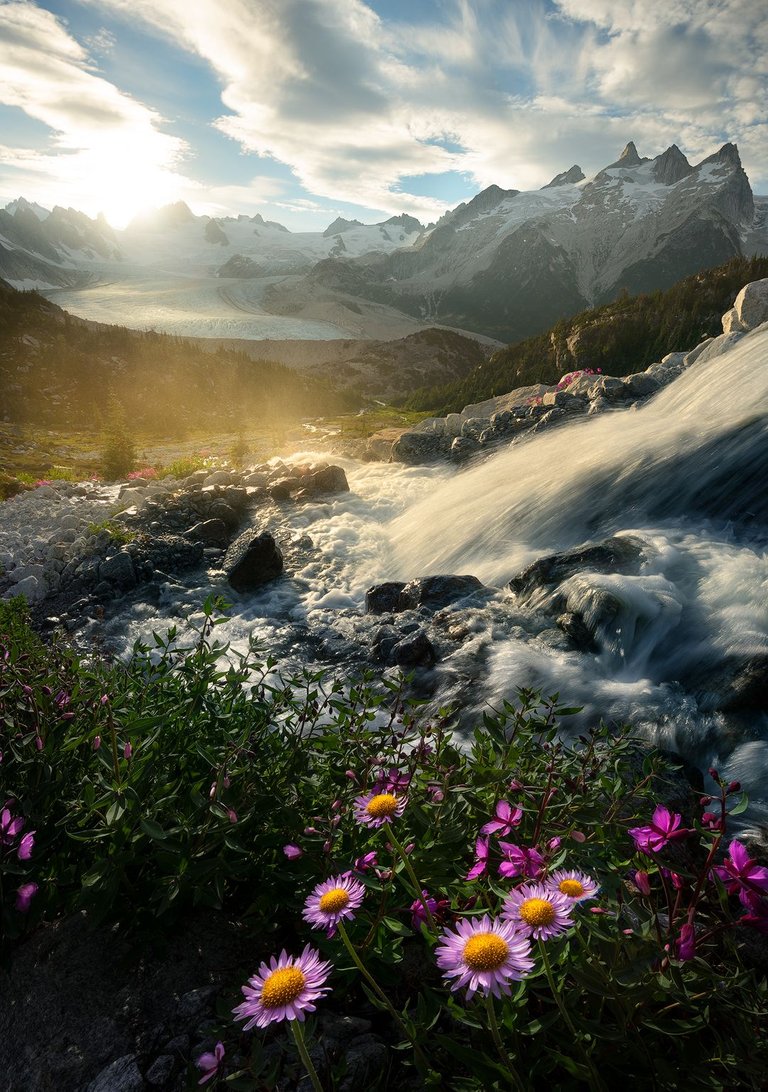
Think about your composition. Is there something that takes away from it? Does it feel unbalanced at all? If there's something in the image that yanks the viewer's eye away from the subject or ruins visual flow, I typically take that as a sign I need to zoom in or adjust my framing or perspective. But, sometimes these things are not noticed until you start editing your image, in which case you can use various post-processing techniques to remove or minimize any distractions.
You can take this technique a step farther if you combine it with tip #1: use lines to 'link' different points of interest in your image! In the example image, I created my composition around 5 major areas of interest, zigzagging from foreground to background: the asters, flowing water, the water spray, the top left and the top right. You could further break the image down into minor areas of interest, such as the midground flowers, distant creek and glacier.
When I shot this image, there was one problem with it: the flowers were very heavy on the bottom right, with the bottom left a complete void. It felt very unbalanced. There was no way to fix this in camera, as there was a giant boulder just out of frame to the right. This was the best angle I could get. So, in post, I pulled the flowers more towards the center and this gave me the balance I was looking for. I also darkened the bottom left corner because I still felt it was a bit distracting.
3. Background Dictates Foreground
This piece of advice can be used in reverse, but typically it's easiest to use your background to determine the foreground due to a wider variety of options available for foregrounds. There are many ways in which this can be accomplished:
- foreground elements that mirror background elements
- warm versus cool
- soft versus harsh
- light versus dark
And so on! The first one can be particularly powerful, and the more of these that you can combine, the better!
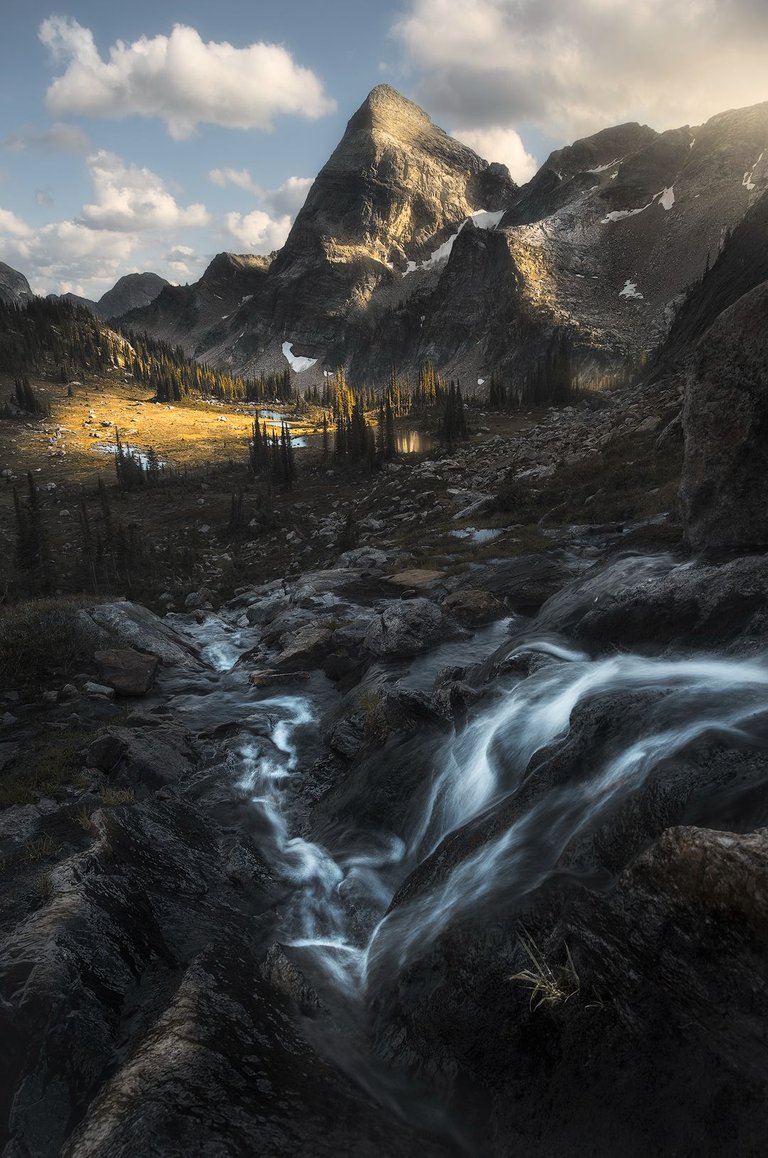
I knew I wanted an image of this mountain, so I searched for a foreground that would complement it. This stream happened to mirror the shape of the mountain, while simultaneously acting as a leading line. In post I was able to take things a step farther, creating a complementary color harmony. Patience also helped, as we waited here for hours to get the best light.
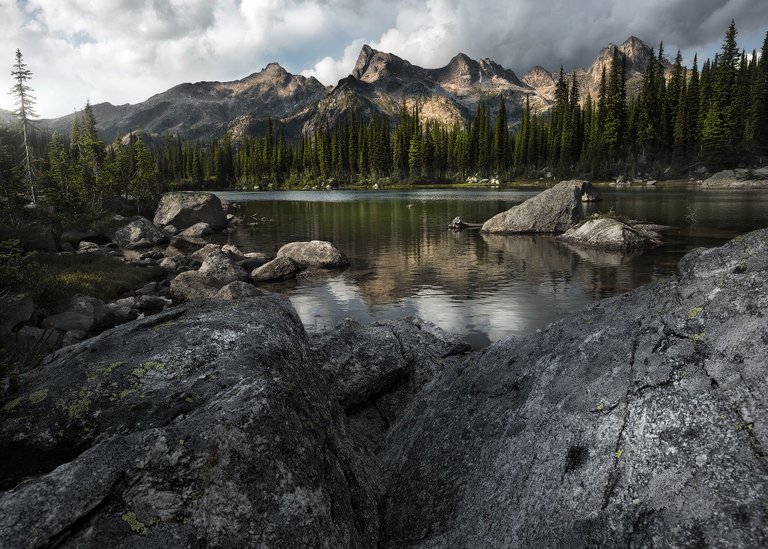
The story is similar for this image! The shape of the mountains is mirrored by the shape of the rocks. Additionally, the foreground is cooler, darker and texture heavy, while the background is warmer, brighter and softer.
4. Natural Frames
You should always be on the lookout for natural frames, even though they're harder to find than leading lines. Often you may find yourself in a situation where you have an awesome frame... but nothing nice for it to frame! However, it's worth the effort because on the off chance that it all works out, it can create a really compelling image.
This first example is a good demonstration that it doesn't need to be anything crazy - here it's just a couple trees!
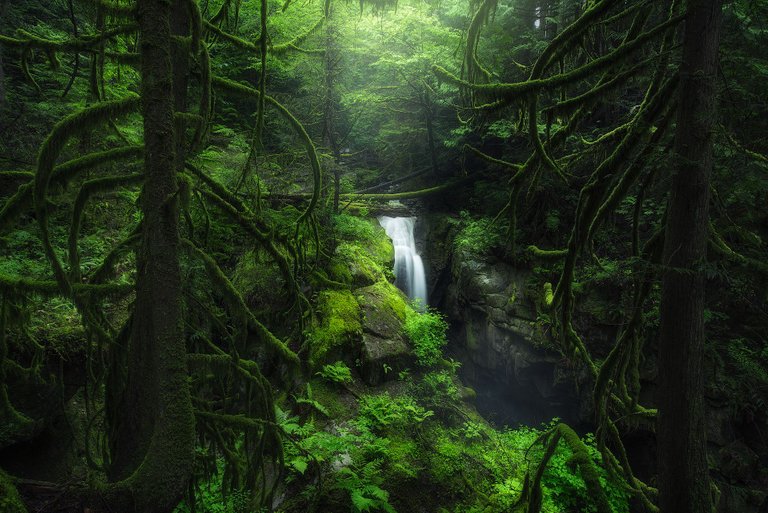
In the image below, I found a natural frame with really nice textures. Frames work really well if you can balance them using some of the things I talked about in the tips above. The background is warmer and softer, while the foreground is cooler and textured. To fully take advantage of this frame, I also did a focus stack to be sure the entire image was in focus.
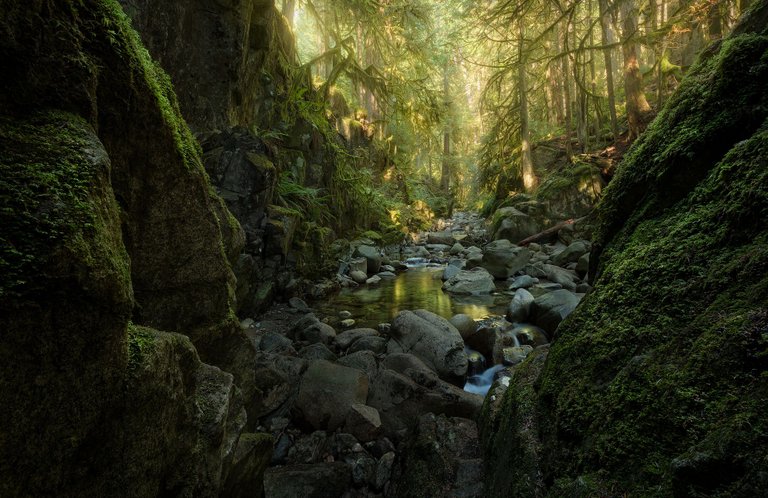
5. Learn Your Location, Be Flexible
This piece of advice might feel a bit vague and less specific, but that's the point. I am not a person that plans out the majority of his images. I prefer to be flexible, keeping myself open to possibilities based on the light and my surroundings. In my opinion, there is no such thing as bad light! Some light may be bad for certain scenes, but there is always a scene that it is good for. It's simply a matter of being able to find it. For example, not every forest image needs to be foggy or filled with rays of light.
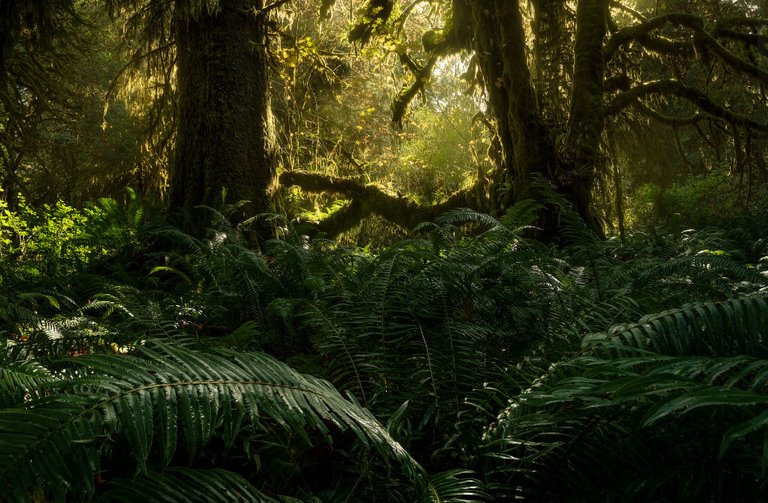
It was a partly sunny day, but that just meant I had to take a slightly different approach. I searched for compositions where the background was illuminated, with the foreground more in the shade. I worked with the light and took advantage of it, rather than being frustrated that there wasn't any mist. This was particularly important as this was my first time visiting this place - a location not very close to home.
I'm a big believer in getting to know your locations. I've visited my favorite places countless times, which allows me to search for things I may have missed. It also means if I see something that looks like it work well in different light, I can keep it in mind for a future visit!
Not everyone may have the luxury of getting to know a location. In that scenario, the latter half still applies: be flexible. Don't chase scenes that don't work with the light at hand and try to shoehorn them in. You'll almost certainly come away with a stronger image if you listen to the light.
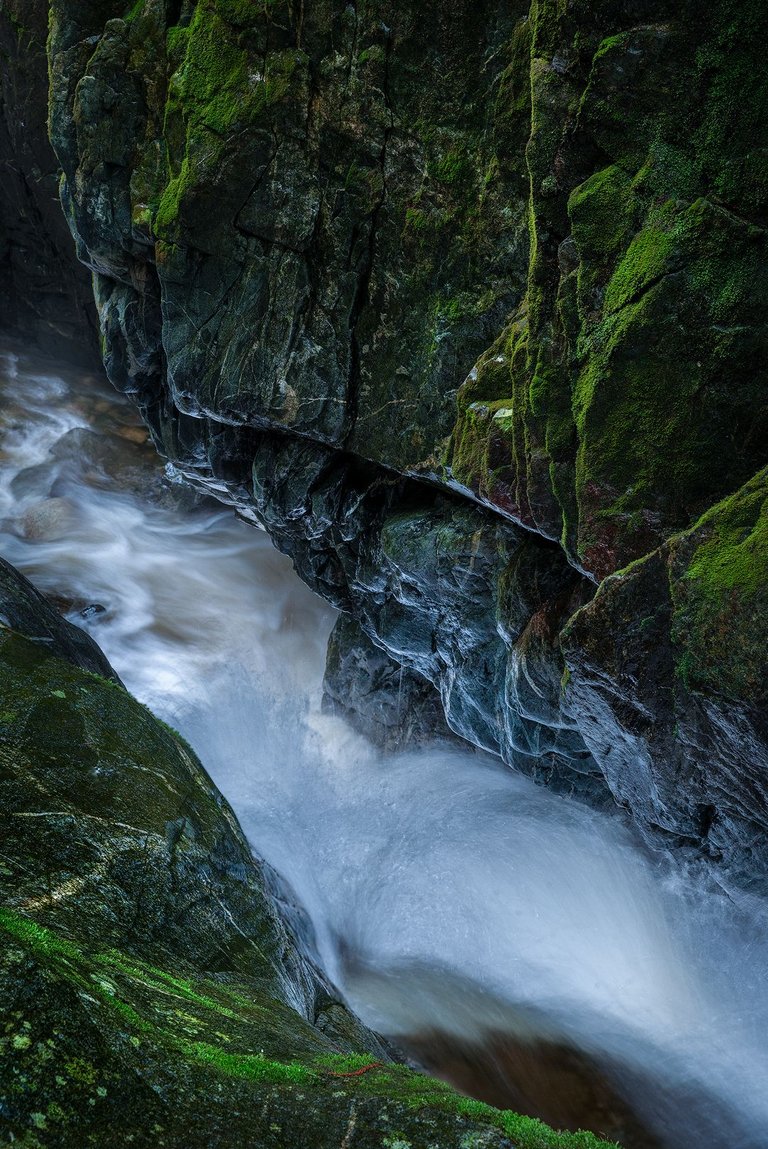
This was taken on a day where the overall light was quite flat, and not conducive to wider scenes. So I zoomed in, focusing on the various textures and the reflected light from the water.
And that's it for today! If you've made it this far, thank you for reading. Please let me know if you have any questions, and if you'd like to see more blogs like this!
Find me elsewhere on the web:
Website: https://www.tristantodd.photography/
Twitter: https://twitter.com/tristan_todd_
IG: https://www.instagram.com/tristan.todd/
Thank you :)
You're welcome! :)
Those were all phenomenal landscapes shots. And helpful tips as well to get me back into it!
Thank you. Hopefully it's useful for you!!
Great tips and your images are really incredible!
Thank you, glad you enjoyed the read!
Great tips! I like your photography and the last picture is quite beautiful, to catch those reflections was a smart idea
Thanks Mary :) Just had a look and your paintings are beautiful!!
Thank you Tristan!🤗
Your locations are some of the most awesome things I've seen online!
Your profile is also impressive!
How do you pull these off? What cameras do you use?
Thank you so much for the kind compliments :)
I use a Nikon D750 but these days the camera doesn't matter so much. Like I said in the blog, it's all about finding light that works with the scene! I'm fortunate to live in British Columbia, where we have some seriously insane landscapes.
I agree with you on that. Finding the right environment for shooting is important.
This is an incredibly insightful post Tristan, and stunning imagery to complement and illustrate your points! Definitely inspires me to get out into the field and apply some of these techniques. Definitely would love to see more posts like this from you!
Fantastic Tristan. Crazy to think how long I've been shooting, and shooting beside you, and yet reading this I still learnt something new to consider when I shoot.
Haha that's cool to hear! I'm curious which one made you think?
Shapes. I knew to look for shapes etc in the main subject and supporting elements, but what caught my eye was the inverted symmetry. Specifically in the shot with the mountain and waterfall where the V shape of the peak is reflected in the water path. I'd never though to look at how the shape mimics eachother.
Yeah those are fun to incorporate. I picked it up by spending too much time looking at Marc Adamus' images haha
Great advice! I agree with everything there. Particularly the distracting elements. If it doesn't add to the image then it is taking away from it. It's so easy to be caught up in the location and miss a huge distraction encroaching in the frame. Then it's a pain to remove in post or just ruins the shot.
Yup exactly. It took me a very long for me to transition away from composing 100% based on feeling. Much more intentional now.
View or trade
BEER.Hey @tristan.todd, here is a little bit of
BEERfrom @thethoughtpolice for you. Enjoy it!Learn how to earn FREE BEER each day by staking your
BEER.Some great tips, I love the one about there being no bad light:) Also, beautiful images of course.
Enhorabuena. Has recibido apoyo
The Creative Coin Fund.
Únete al servidor de Creative Coin y comparte tus publicaciones.
Congratulations. You have received support from
The Creative Coin Fund.
Join the Creative Coin server and share your posts.
Selección manual de @elemarg25
Image by barbara-orenya
Congratulations @tristan.todd!
You raised your level and are now a Minnow!
Check out the last post from @hivebuzz:
Support the HiveBuzz project. Vote for our proposal!
Congratulations @tristan.todd! Your post has been a top performer on the Hive blockchain and you have been rewarded with the following badge:
You can view your badges on your board and compare yourself to others in the Ranking
If you no longer want to receive notifications, reply to this comment with the word
STOPCheck out the last post from @hivebuzz:
Support the HiveBuzz project. Vote for our proposal!
Congratulations @tristan.todd! Your post has been a top performer on the Hive blockchain and you have been rewarded with the following badge:
You can view your badges on your board and compare yourself to others in the Ranking
If you no longer want to receive notifications, reply to this comment with the word
STOPCheck out the last post from @hivebuzz:
Support the HiveBuzz project. Vote for our proposal!
I wanted to take a minute and thank you for sharing your knowledge and excellent photos. The community really appreciates it and a lot of times we pass right by and don't actually thank the contributor. Have a !BEER
Fantastic work and advice @tristan.todd thanks much for the share.